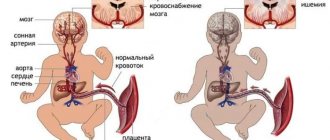Hyperactivity is a problem for modern children
Nowadays, you can increasingly hear complaints from parents and teachers about the fact that children have become hyperactive, it is impossible to calm them down and force them to do something, but “this was not the case before.” That is, there are observations: past generations of children were not so active, excitable, and uncontrollable. As a result, this hyperactivity syndrome creates many problems: psychological, physiological. Hyperactivity interferes with a child’s mental development, the formation of his character, and negatively affects his health.
Why is hyperactivity so unpleasant and dangerous?
Hyperactive children may withdraw into themselves, avoid contact with their parents, or, conversely, may become overly sociable. A toddler or school-age child who is disobedient and too active is very difficult to train. Children do not listen to what they are told, do not perceive comments, and even praise is indifferent to them. As a result, important feedback from parents and teachers is lost.
Unfortunately, with hyperactivity, outbreaks of unmotivated aggression are also observed, which manifests itself at the level of blind instincts. At the same time, the child is stubborn, very wayward, and inattentive.
Some children with this syndrome begin to build a wall between their world and adults. They are active, but at the same time psychologically closed. They are distinguished by fear of communicating with elders and complexes.
Undoubtedly, almost all accompanying signs of behavior significantly complicate the process of raising a child, and sometimes simply make it impossible to communicate with him. This is a serious problem.
How to deal with a child with ADHD?
In addition to drug therapy, the doctor will prescribe behavior correction for the baby’s parents. This:
- avoiding too high demands on the child;
- adherence to daily routine;
- frequent praise of the baby;
- teaching the child proper relationships with peers;
- introducing the child to social norms in a playful way.
Parents should try to create situations for their child in which he can show his strongest sides. To do this, it is better to use various games in which physical activity is combined with moments of a calm state.
Swimming, modeling, and dancing help correct the behavior of a hyperactive child. But you also cannot do without drug treatment.
Excitability and hyperactivity
Experts note that one should distinguish between ordinary nervous excitability and real hyperactivity. The situation with hyperactivity is much more serious. This condition in a child got its name in the 80s: it was called attention deficit hyperactivity disorder - ADHD.
The disease belongs to hyperkinetic type disorders, if we consider the classification of mental and nervous ailments.
It is important to understand that if the baby is simply active and often plays pranks, this does not yet signal this particular syndrome. A child of preschool or younger age may simply have such a character.
Psychologists do not recommend being too strict with such children. We need to develop the right line of behavior, learn how to properly stimulate the baby so that he begins to behave in the desired way. This is where the support of an individual psychologist comes in handy.
Symptoms of hyperactivity
Hyperactivity in a child: what to do, how to help, how to correctly identify it. Parents are increasingly concerned about these issues. However, first of all, it is important to determine that the baby has this particular syndrome. It is known that hyperactivity becomes noticeable gradually. A child may develop well until the age of 3, and then signs of ADHD will begin to appear. Parental observation plays a huge role here. It is necessary to identify symptoms as early as possible in order to begin treatment at the initial stage and provide the child with comprehensive psychological support.
If you don’t start therapy on time, don’t change your entire parenting plan, or consult a specialist, you can easily waste time. And as a result, children become uncontrollable, completely out of control, and some even end up in appropriate educational institutions. After all, even a regular school curriculum turns out to be impossible for them.
The later painful symptoms are identified, the more difficult it will be to fight them in the future.
If there is any suspicion that the child is developing the syndrome, it is necessary to go to the doctor as soon as possible, and also go to see a psychologist.
Here are the essential features experts highlight:
- inattention, painful forgetfulness;
- the child begins to throw things around, the room is a mess, he cannot find anything;
- inability to concentrate, focus on something;
- night sleep becomes poor, it is very difficult for the child to fall asleep, then he often wakes up, talks or screams, cries in his sleep, and ultimately does not get enough sleep;
- parents’ requests are ignored, the child does not perceive them and does not recognize authority;
- behavior becomes inappropriate and aggressive;
- emotional outbursts, unmotivated irritability, impulsiveness are possible;
- children cannot cope with any tasks; activity itself is a problem for them, since there is no concentration or composure;
- in the daytime the child is especially excitable, he is very restless;
- perseverance and concentration on one thing cannot be achieved.
If you notice several similar symptoms in a child at once, you should immediately contact a specialist.
Predisposition to the syndrome
You need to know all the key risk factors to understand whether a particular child has a predisposition to developing hyperactivity syndrome. Thus, experts note that ADHD develops quite often in those children whose parents themselves suffered from this syndrome in childhood, or simply had a choleric, unstable character.
It is also known that children largely copy the behavior of adults. If parents are overly emotionally excitable and temperamental, children may also begin to repeat their behavior, but only exaggerate everything. Do not forget about direct genetic predisposition.
Here are a few more risk factors for the development of ADHD:
- conflict situation in the family;
- protracted, rapid labor;
- pregnancy is premature;
- there are many diseases, there is retardation of physical development;
- there are all the signs of parental dictatorship, the upbringing is excessively harsh;
- there was asphyxia in the womb;
- the pregnancy was difficult, with periods of acute toxicosis;
- parents divorced and moved away.
Of course, here you can easily identify two main areas of risk factors: physiological and psychological. And the psychological and emotional climate in the family is of great importance here. An atmosphere of trust, care and love is also very important for proper upbringing. And the process of education itself should not turn into a kind of training, there should be no “totalitarian” principle of suppression, the child’s personality must be respected. If you don’t strive for this, everything bad in the child’s behavior will only take root.
Possible mistakes in parenting
The most important mistake parents make when raising a hyperactive child is ignoring such a deviation. The main mistakes made by moms and dads include:
- inflated expectations from the child;
- Development and training requirements are too stringent;
- increased care of the baby.
Hyperactive children are naughty. Discipline is definitely not for them. They are indifferent to both praise and punishment. They are easily distracted by third-party things and do not finish what they start.
If parents are too strict and demanding of their child or, on the contrary, overprotect him, then the baby grows up as an anxious and hyperactive child. It also happens that recently mom and dad allowed everything, and then suddenly they began to forbid us to indulge. Then he may painfully perceive such abrupt transitions in educational methods.
Correct parenting behavior will help overcome hyperactivity
First of all, all specialists, doctors and psychologists, note: it is very important for parents themselves to build the right line of behavior.
It is strictly forbidden to set a bad example for children, to demonstrate short temper and irritability, or emotional instability.
Of course, aggression should be prohibited. For example, parents may shout or talk rudely, both to each other and to the child. It is unacceptable. The atmosphere in your home should always be calm and attractive for children. It is important for a child to understand that it is in the home that he will always be understood and accepted, supported and consoled. It is necessary to cultivate confidence and calmness in the child, and not suppress or intimidate him.
It is no coincidence that the disease is commonly called attention deficit disorder. The child needs the attention of his parents and meaningful communication with them. At the same time, we need to relax together in nature, go hiking. It is useful to walk in the forest and pick mushrooms. All this pacifies, teaches to appreciate and perceive the beauty and harmony of the world around us.
What to do when you are hysterical?
If a hyperactive child has a tantrum and he stops hearing those around him, parents can simply go to another room. Then the baby, having lost his existing audience, will gradually calm down.
You can try to switch your child's attention to an interesting cartoon or a new toy. It’s a good idea to invite him to play an active game, for example, tag. It is also useful for your baby to make soothing tea or warm sweet water.
In order to subsequently avoid the hysterical state of your own child, you need to strengthen his nervous system. To do this, it is useful to take baths with the addition of valerian herb.












